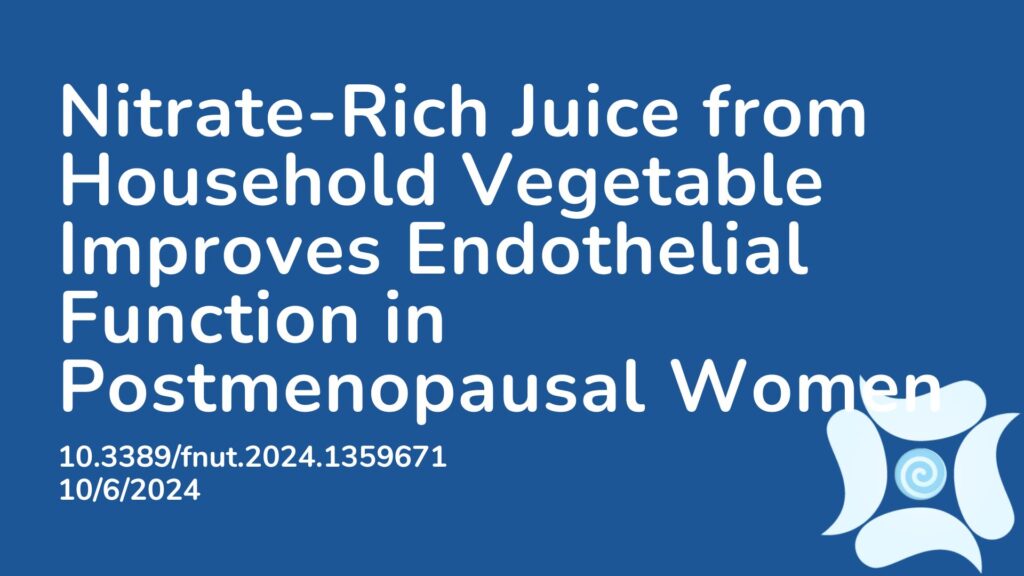Summary:
Cardiovascular disease (CVD) risk increases after menopause due to decreased estrogen levels, which are crucial for maintaining vascular health and nitric oxide (NO) levels. While estrogen therapy can be effective for women who have recently entered postmenopause, it can also pose health risks, highlighting the need for alternative treatments for later-stage postmenopausal women. Nitrate-rich beetroot juice (BJ) is a promising alternative that enhances NO levels and improves endothelial function. Previous research has shown that a single dose of BJ improved health outcomes in early-postmenopausal women. This study aimed to evaluate whether 7-day BJ supplementation benefits endothelial function and NO levels, particularly in early versus late-postmenopausal women. Early-postmenopausal (1-6 years since final menstrual period) and late-postmenopausal (6+ years since final menstrual period) women consumed either nitrate-rich (400 mg) BJ or nitrate-depleted BJ (approximately 40 mg, placebo) daily for 7 days. Baseline measurements were taken on Day 0 and approximately 24 hours after the last dose (Day 8). The results showed that BJ significantly improved health parameters in postmenopausal women, but the benefits depended on consistent supplementation and individual variations in nitrate metabolism. The positive health impacts of BJ were not present 24 hours after cessation of supplementation.
Abstract:
Introduction: Cardiovascular disease (CVD) is the leading cause of death in women, with increased risk following menopause. Dietary intake of beetroot juice and other plant-based nitrate-rich foods is a promising non-pharmacological strategy for increasing systemic nitric oxide and improving endothelial function in elderly populations. The purpose of this randomized, placebo-controlled, double-blind, crossover clinical trial was to determine the effects of short-term dietary nitrate (NO3−) supplementation, in the form of beetroot juice, on resting macrovascular endothelial function and endothelial resistance to whole-arm ischemia–reperfusion (IR) injury in postmenopausal women at two distinct stages of menopause.
Methods: Early-postmenopausal [1–6 years following their final menstrual period (FMP), n = 12] and late-postmenopausal (6+ years FMP, n = 12) women consumed nitrate-rich (400 mg NO3−/70 mL) and nitrate-depleted beetroot juice (approximately 40 mg NO3−/70 mL, placebo) daily for 7 days. Brachial artery flow-mediated dilation (FMD) was measured pre-supplementation (Day 0), and approximately 24 h after the last beetroot juice (BR) dose (Day 8, post-7-day BR). Consequently, FMD was measured immediately post-IR injury and 15 min later (recovery).
Results: Results of the linear mixed-effects model revealed a significantly greater increase in resting FMD with 7 days of BRnitrate compared to BRplacebo (mean difference of 2.21, 95% CI [0.082, 4.34], p = 0.042); however, neither treatment blunted the decline in post-IR injury FMD in either postmenopausal group. Our results suggest that 7-day BRnitrate-mediated endothelial protection is lost within the 24-h period following the final dose of BRnitrate.
Conclusion: Our findings demonstrate that nitrate-mediated postmenopausal endothelial protection is dependent on the timing of supplementation in relation to IR injury and chronobiological variations in dietary nitrate metabolism.
Article Publication Date: 10/6/2024
DOI: 10.3389/fnut.2024.1359671



